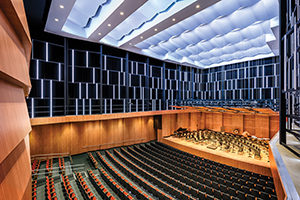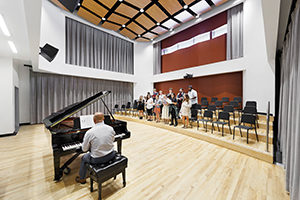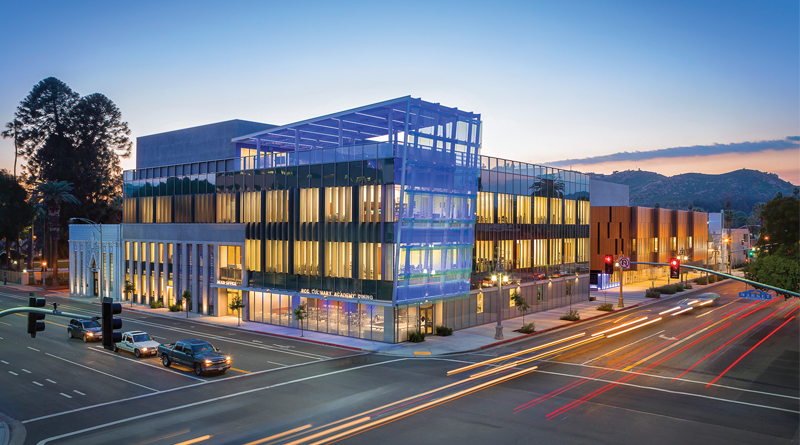Facility of the Month: Riverside Community College District Engages the Community at
By Jessie Fetterling
RIVERSIDE, Calif. — Riverside Community College District (RCCD) officially joined the Riverside community last summer when it opened a performing arts building and culinary arts school in downtown in time for the 2016-17 school year. Its new Coil School for the Arts (CSA) and Culinary Arts Academy and District Offices (CAADO) blend in with the city’s historic Centennial Plaza, which is also home to the Center for Social Justice and Civil Liberties that was rehabilitated in 2012.
The location of the two facilities provides more opportunities for RCCD students to engage with the community in a more hands-on approach that better trains them for the professional world. Irvine, Calif.-based LPA Inc. served as the architect on the project, while locally based Tilden-Coil Constructors Inc. served as the general contractor.
“The main goal was to design an educational and cultural hub at the heart of downtown Riverside,” said Franco Brown, associate/design director for LPA Inc. “By moving key programs such as the School of Music and the Culinary Arts Academy ‘off-campus,’ the district brought the arts to the local community while benefiting from the exposure and synergies created.”
“The development of a comprehensive block in downtown with programs that have patrons and members of the public allowed the college district to move these programs into the community spotlight,” added Chris Carlson, chief of staff and facilities development at RCCD. “Each facility is designed to advance the programs; the former locations were inadequate for the current and future program development to help students preparing for the workforce in these areas.”
Culinary Arts Academy & District Offices
At 60,000 square feet, CAADO was the larger portion of the project. It features a demonstration kitchen and a restaurant open to the public with a vegetated rooftop deck for special events and performances that give students practical experience while also allowing the community to host celebrations.

“The previously secluded Culinary Arts Academy has now taken a center-stage location in downtown Riverside,” Brown said. “The program offers students an education in the different specialties of the culinary arts (including ice carving) with the vital experience of a real-world restaurant. The new facility gives students the traditional hands-on approach complemented with distance learning and access to online archival material produced in the demonstration kitchen.”
Unlike most traditional culinary art facilities, the CAADO building takes advantage of its prominent location, with all of the kitchens and a bakery situated on the building perimeter, facing the street, according to Brown. In contrast, the demonstration kitchen was located in the center of the layout to control light and the digital technology for recording and broadcasting sessions. In fact, this space was designed to be more like a television set than a traditional classroom. Last but not least, the project is centered around a 120-seat restaurant located on the corner that is open to the public. A glass tower element serves as a beacon at nighttime and connects the restaurant to the rooftop deck.
“Using glass ‘portals,’ we let the activities inside be ‘displayed’ to pedestrians and people driving by,” Brown said.
Having these activities on display attracts community engagement, and specifically the demonstration kitchen and rooftop terrace allow the district to advance and change the curriculum in ways they were unable to before, according to Carlson. He added that another key part of the CAADO building is that it brings all the district’s offices into one location instead of keeping them in the four separate locations that previously housed them.
Coil School of the Arts
As the new home for the Riverside City College music program, the CSA building also takes the spotlight (pun intended) in the community with its 450-seat concert hall and performance stage, primarily driven by acoustics to achieve uncompromising sound quality, according to Brown. The building also includes classrooms, practice rooms, a choral room, band room, orchestra room, a piano lab and a high-technology recording studio.

“The concert hall itself was conceived as a music instrument, applying the same principle of the resonance chamber found in many string instruments to achieve a three-second reverberation time for choir performances,” Brown said. “Sound absorptive panels, mechanized perimeter drapery and a moveable stage cloud can all be configured to cater to the large variety of music genres offered by the school program.”
A combination of new and proven technology was used throughout the building, Brown added. The 33 practice rooms were physically isolated from the adjacent concert hall using hanging stud walls and a floating concrete slab to avoid any sound interference. For the concert hall, a latticework of LED lights creates what Brown called a “visual boundary” for the space while allowing the sound through. Even a digital menu of multiple light patterns was programmed in to give users the ability to select the right atmosphere for each performance.
Due to a code height limitation, the service space at catwalk level had to integrate the structural, mechanical, electrical, rigging, fire-suppressing and lighting systems in a constrained space, according to Brown. During the design development, LPA’s integrated design team used BIM software technology to achieve this complex system coordination, something that a decade ago would have been nearly impossible.
“Having a music performance hall, recording studio and triple the number of practice rooms is a game changer, and so is having a home for all performances versus moving from venue to venue,” said Carlson. “This has been a huge success for them, with community and professional engagement. The Riverside Philharmonic even moved its performance venue from the Fox Performing Arts Center to the Coil School for the Arts, providing more opportunities for students.”
To read the entire article, check out the September/October issue of School Construction News.

